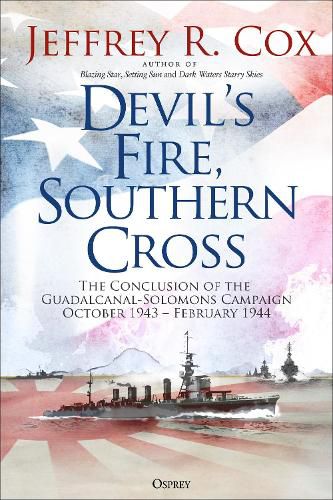Readings Newsletter
Become a Readings Member to make your shopping experience even easier.
Sign in or sign up for free!
You’re not far away from qualifying for FREE standard shipping within Australia
You’ve qualified for FREE standard shipping within Australia
The cart is loading…






A fast-paced and absorbing read of the final months of the crucial Guadalcanal-Solomons Campaign during the Pacific War by esteemed World War II historian Jeffrey Cox.
This page-turning history examines the closing months of the vital campaign which ultimately determined the successful conclusion of the Pacific War for the Allies. But it had not been a smooth process. The campaign continued in fits and starts with both the US Navy and the Imperial Japanese Navy making crucial errors.
But as the pendulum of war swung, there was one distinct advantage to the Allies. This was the successful efforts by the United States Army Signals Intelligence Section and the Navy Communication Special Unit to monitor, intercept, decode and translate Japanese messages. It was thanks in part to this intelligence breakthrough that victory was secured at the Battles of Empress Augusta Bay and Cape St. George as well as the bitterly contested Bougainville invasion. But it was also due to improvements in strategic and tactical doctrine on the part of the US Navy, so much so that the Battle of Cape St. George was dubbed the almost textbook-perfect battle.
At the start of the Guadalcanal-Solomons Campaign the US Navy was the underdog. By its conclusion, US naval commanders had come of age. Combining first-rate scholarly research with a novelist's flair for the dramatic, Jeff Cox concludes his brilliant quartet on this key campaign.
$9.00 standard shipping within Australia
FREE standard shipping within Australia for orders over $100.00
Express & International shipping calculated at checkout
A fast-paced and absorbing read of the final months of the crucial Guadalcanal-Solomons Campaign during the Pacific War by esteemed World War II historian Jeffrey Cox.
This page-turning history examines the closing months of the vital campaign which ultimately determined the successful conclusion of the Pacific War for the Allies. But it had not been a smooth process. The campaign continued in fits and starts with both the US Navy and the Imperial Japanese Navy making crucial errors.
But as the pendulum of war swung, there was one distinct advantage to the Allies. This was the successful efforts by the United States Army Signals Intelligence Section and the Navy Communication Special Unit to monitor, intercept, decode and translate Japanese messages. It was thanks in part to this intelligence breakthrough that victory was secured at the Battles of Empress Augusta Bay and Cape St. George as well as the bitterly contested Bougainville invasion. But it was also due to improvements in strategic and tactical doctrine on the part of the US Navy, so much so that the Battle of Cape St. George was dubbed the almost textbook-perfect battle.
At the start of the Guadalcanal-Solomons Campaign the US Navy was the underdog. By its conclusion, US naval commanders had come of age. Combining first-rate scholarly research with a novelist's flair for the dramatic, Jeff Cox concludes his brilliant quartet on this key campaign.